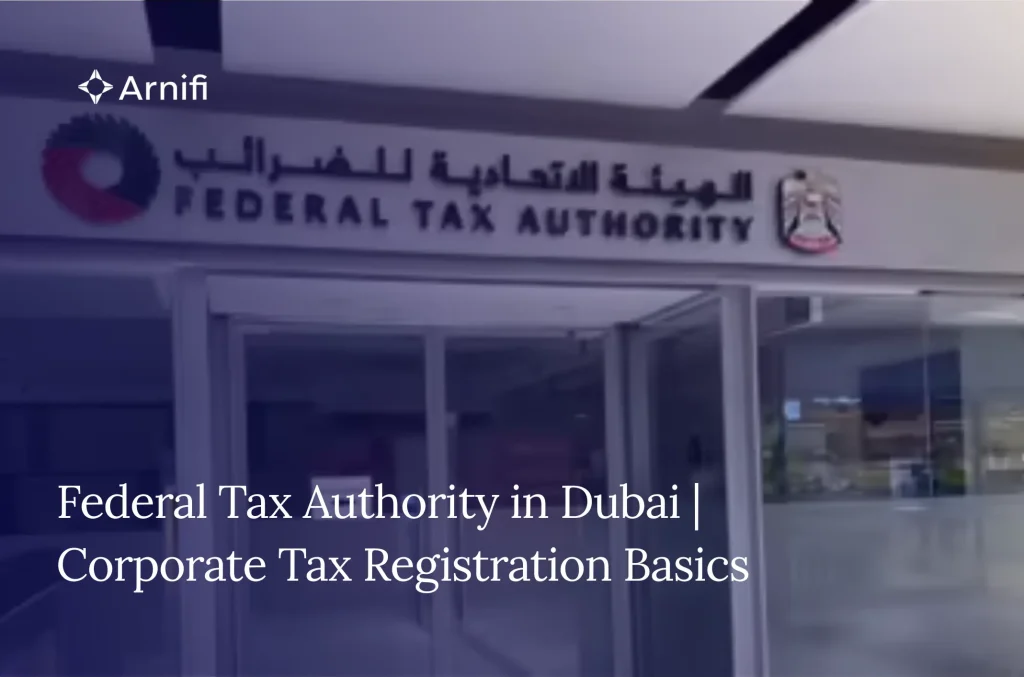Federal Tax Authority in Dubai | Corporate Tax Registration Basics
by Shethana Nov 19, 2025  6 MIN READ
6 MIN READ

The federal tax authority in Dubai now covers value added tax and corporate income tax. Processes are centralised on EmaraTax, and enforcement relies on accurate records that can be produced quickly during reviews.
Table of contents
- What is the Federal Tax Authority in Dubai?
- VAT Overview in Plain Terms
- Corporate Tax Basics
- Filing Discipline That Helps Maintain a Clean Corporate Tax Profile
- Audits and Information Requests
- Penalties Likely to Happen for the Following Errors in the Management
- Practical Controls for Finance Heads
- Final Advice
- FAQs
This guide explains scope, registrations, filings, audits, penalties, and practical controls for companies operating in the country.
What is the Federal Tax Authority in Dubai?
The tax administration sets policy guidance, maintains registration and filing portals, assigns periods, collects tax and penalties, and runs desk and field audits. In practice, that means three day-to-day touchpoints for finance teams:
- Registration for each tax that applies.
- Periodic returns and payments that tie back to ledgers.
- Responses to letters and information requests with evidence.
VAT Overview in Plain Terms
Who registers?
Resident businesses whose supplies exceed AED 375,000, non-residents making taxable supplies where no UAE buyer applies reverse charge, and residents above the AED 187,500 voluntary threshold on supplies or expenses.
Rates and scope
Standard rate on most domestic supplies, zero rate for defined categories such as exports and qualifying sectors, exempt treatment for specified items such as certain financial services and local passenger transport.
Invoices
Tax invoices require all core fields including TRN, description, consideration, VAT amount, and FX conversion where relevant.
Returns
Periods are commonly quarterly, sometimes monthly. Returns and payments are due shortly after the period ends.
Evidence
Export proofs, customs declarations, supplier TRNs, contracts, delivery notes, and bank records should be indexed by period.
Corporate Tax Basics
Scope
Most UAE-incorporated entities, some foreign entities with a nexus, and free zone persons with special conditions.
Rate and base
Standard 5 percent VAT on most taxable supplies, 0 percent for zero rated categories such as exports, healthcare and education, and exemptions for financial services, residential rents and local passenger transport.
Records
Clean accounting is the first control. Classification of revenue, cost of sales, overheads, provisions, and related-party charges decides accuracy at computation time.
Free zone notes
Maintaining preferential treatment depends on qualifying income tests, excluded activities, and substance. Segregated ledgers and evidence are essential.
The phrase federal authority tax is sometimes used informally to describe corporate income tax administration at the federal level. In practice, the functions sit in the same infrastructure that handles VAT.
Filing Discipline That Helps Maintain a Clean Corporate Tax Profile
Monthly bookkeeping, quarterly reviews. Closing ledgers each month and running technical checks each quarter keeps filings predictable.
Reconcile by return boxes. Map charts and tax codes so standard-rated sales, zero-rated sales, exempt items, imports, and reverse-charge services roll into the correct boxes without manual edits.
Document at source. Link invoices, customs forms, contracts, and bank proof to each transaction. Index by period. Evidence that is captured late is usually incomplete.
Lock templates. Invoice and credit note formats should be fixed in systems. Sequential numbering and FX fields reduce avoidable corrections.
Group and related-party discipline. Maintain agreements, allocation keys, and working notes for intercompany flows. These files support both VAT logic and corporate-tax transfer-pricing needs.
Audits and Information Requests
- Desk audits. Letters request copies of invoices, contract excerpts, reconciliations, and proof of export or import. Clear scans and reconciled totals shorten the cycle.
- Field visits. Officers may inspect premises, inventory, and systems. Access to accounting platforms, user roles, and archival storage should be defined in advance.
- Time limits. Deadlines in letters are tight. A standing process for pulling evidence avoids last-minute scrambles.
- Result handling. Outcomes can include acceptance, adjustments, penalties, or directions to correct future treatment. Keep a post-audit memo that records positions taken and any agreed changes.
Penalties Likely to Happen for the Following Errors in the Management
- Late filing or payment. Administrative penalties apply and can accumulate by day and by event.
- Invoice defects. Missing TRN or incorrect fields can trigger fines and customer disputes.
- Incorrect treatment. Misclassifying zero-rated or exempt supplies or missing reverse-charge entries creates understatements.
- Voluntary disclosures. Material errors in closed periods should be corrected through the official mechanism, with calculations and board approvals kept on file.
Practical Controls for Finance Heads
- Ownership map. List legal entities, free zone status, registrations, periods, and responsible staff.
- Tax code register. Document each code with the legal treatment it represents. Restrict who can create new codes.
- Import and export binder. Customs entries, bills of lading, airway bills, and proof of exit linked to purchase or sales entries.
- Contract tracker. Master service agreements and pricing schedules, especially for intercompany and cross-border flows.
- Close calendar. Month-end, quarter-end, return filing, and payment cut-offs with named reviewers.
- Data room. A permanent archive by period containing ledgers, returns, evidence, and portal receipts.
Final Advice
Bookkeeping must be done monthly with clean tax codes, technical reviews run each quarter, and corporate-tax computations built from audited accounts without late reclassification. Audits and letters should be answered with files, not fresh spreadsheets.
Feeling confused? Hire expert accounting and bookkeeping services. Arnifi supports registration, return preparation, refund claims, and audit responses for entities across the UAE.
FAQs
1. What is the relationship between VAT and corporate tax administration?
Both taxes run through the same national infrastructure, with separate registrations and returns. Good accounting feeds both, so one control layer should serve the two regimes.
2. When does an entity need to register for VAT?
Registration becomes mandatory when supplies and imports cross the mandatory threshold or when non-resident status combines with taxable supplies that are not reverse charged by a UAE recipient.
3. How are free zone entities treated for corporate tax?
Preferential treatment depends on qualifying income and substance. Activities that fall outside the qualifying list are taxed at the standard rate.
4. What records must be kept?
Invoices, credit notes, contracts, delivery and shipping proofs, customs forms, payroll records, bank statements, and reconciliations should be retained for the statutory period and be easy to retrieve.
5. How are refunds handled?
Refund claims require reconciled ledgers and strong evidence. Many entities file a claim after a full internal review to prevent repeat queries.
Top UAE Packages

Related Articles
Top UAE Packages



